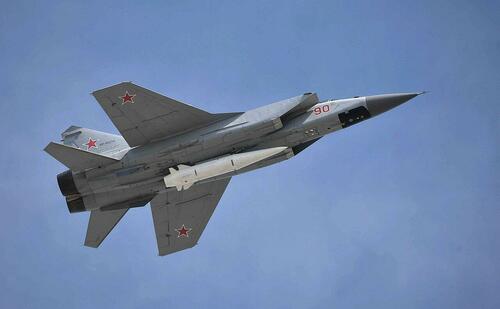3 Arrested Russian Scientists Accused Of Handing Hypersonic Missile Secrets To China
A week ago, just as Ukraine was claiming to have shot down Russian hypersonic Kinzhal missiles, three top Russian scientists who’ve reportedly worked on the country’s hypersonic program were arrested on suspicion of treason.
The Kremlin had said the three face “very serious accusations”. They were identified as Anatoly Maslov, Alexander Shiplyuk and Valery Zvegintsev – and worked at the Khristianovich Institute of Theoretical and Applied Mechanics in the Siberian city of Novosibirsk. Shiplyuk was actually director of the institute, thus the highly visible case has sent shockwaves through the Russian ruling establishment and academic community.

The arrests were under mysterious circumstances, given the Kremlin didn’t spell out the details of the allegations against them, and immediately set off rare public outcry from other scientists angered over their detention.
When pressed on the nature and specifics of the case, Kremlin spokesman Dmitry Peskov only said that security services are being extra watchful concerning potential cases of “betrayal of the motherland” at this sensitive time of the war in Ukraine.
Now, on Wednesday, Reuters in an exclusive has cited sources saying the scientists are accused of betraying classified hypersonic program secrets to China. Director Shiplyuk in particular “is suspected of handing over classified material at a scientific conference in China in 2017, the sources said,” according to the report.
“The 56-year-old maintains his innocence and insists the information in question wasn’t classified and was freely available online, according to the people, whom Reuters has chosen not to identify to safeguard their security.”
He and his supporters in the academic and scientific community in Russia say that the information in question which may have been shared with Chinese counterparts was not at all secret. Per Reuters:
“He is convinced of the fact that the information was not secret, and of his own innocence,” one of the people said.
The nature of the allegations against the ITAM director, who was arrested last August, has not been previously reported. The Chinese connection would make Shiplyuk the latest in a string of Russian scientists who have been arrested in recent years for allegedly betraying secrets to Beijing.
Indeed such recent arrests of top officials have had a chilling effect inside Russia, particularly among circles which are critical of recent Kremlin decision-making regarding the Ukraine war and tactics utilized.
Did an information breach make the “unstoppable” hypersonic missiles more vulnerable to shootdown?
5. After the US supplied #Patriot systems shot down Russia’s invincible #Kinzhal #hypersonic missiles the Kremlin arrested three Russian scientists on charges of treason for allegedly leaking critical data that made the missiles less invincible than the Kremlin had claimed. pic.twitter.com/ANpRcpY6J6
— Tim Hogan ?? (@TimInHonolulu) May 20, 2023
The Reuters report has further speculated on just which top Chines officials may be on the other side of the suspected breach of classified technology and information:
ITAM, sited at the Academgorodok science campus near the city of Novosibirsk, says on its website that it is registered as a part of Russia’s military-industrial complex. The institute has had extensive international links including contacts with companies, universities and research centres across the world, according to a 2020 online document that outlined its work.
Among the institutions listed was the China Aerodynamics Research and Development Center (CARDC), whose website includes several posts celebrating experimental breakthroughs relating to fighter jets and hypersonic missiles.
The CARDC site names the center’s director as Wang Xunnian. According to two official Chinese local government websites, Wang is a major general in China’s People’s Liberation Army (PLA).
One Russian colleague of the detained scientists has complained that handing off information to other allied international researchers should be seen as relatively benign. “It’s a long path. Just doing the basic research does not provide you with a missile,” the sources said.
Given recent updated laws in the wake of the Ukraine conflict, a conviction on treason in Russia could bring anywhere from 20 years to life in prison.
Tyler Durden
Wed, 05/24/2023 – 21:50
